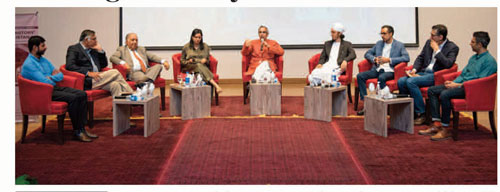The Department of Social Sciences and Liberal Arts, School of Economics and Social Sciences (SESS) at the Institute of Business Administration (IBA) Karachi organized a two-day workshop titled, ‘Doing History’ in Pakistan, on March 7-8 to offer a platform for historians who are working in Pakistan as well as ‘on’ Pakistan and broader South Asia, to discuss issues related to their discipline and think about how they can adopt a more innovative approach towards the themes and topics they teach and the modes in which they teach them to students at local universities.
The keynote address was delivered by Dr. Katherine Butler Schofield, Senior Lecturer in South Asian Music and History, King’s College London, UK whereas four scholars from Quaid-i-Azam University (QAU), Beaconhouse National University (BNU), Lahore University of Management Sciences (LUMS), and IBA Karachi, graced the event as speakers and discussants.
Explaining the rationale behind the selection of speakers for the panels, Ms. Zahra Sabri, chief organiser of the workshop, and a Lecturer in Indo-Islamic History and Literatures at the SESS, IBA Karachi shared that she had tried to bring together scholars doing diverse kinds of History in Pakistan, to educate the audience about the discipline and what kind of History should or should not be done in Pakistan, but also to get a solid and specific taste of the diverse branches of History that prominent scholars in Pakistan are presently working on.
The Executive Director, IBA Karachi, Dr. S. Akbar Zaidi in his opening remarks said, “Where are the trained food historians, labour historians, historians of culture, or even institutions, in Pakistan, leave alone Pakistani historians teaching Latin American or African History? Or, for that matter, historians addressing questions of theory, and themes of a global or interconnected history?” He expressed that the event being organised at the IBA would address such vital questions and welcomed the students and teachers at the event.
The first panel, ‘Knowledge and Identity in the Persianate Ecumene’, featured presentations dealing with the History of Science, Literary/Cultural History, and Architectural History. Dr. Moiz Hasan from IBA, talked about the Iranian polymath theologian Sayyid al-Sharif al-Jurjani and his vision of the mathematical sciences; Ms. Zahra Sabri from IBA, discussed the famous Indian poet Amir Khusrau’s sense of pride in the linguistic and literary accomplishments of residents of Delhi who wrote in Persian; and Dr. Shayan Rajani from LUMS, analysed South and Central Asia’s architectural heritage to highlight how places like Kandahar and Sindh were historically linked through ties of Mughal sovereignty.








